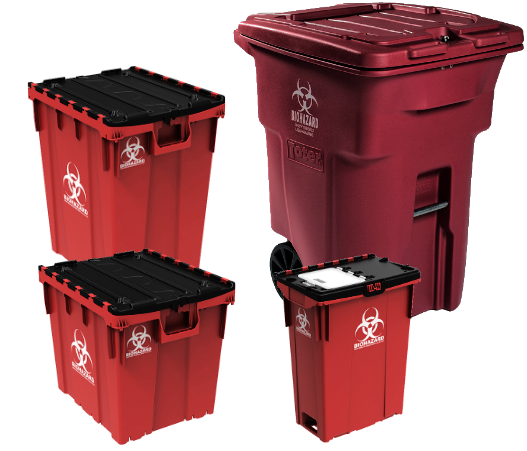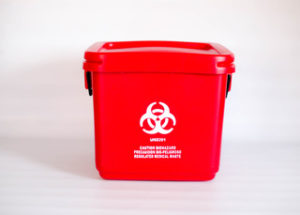The Importance of Proper Waste Disposal Practices
The monitoring of waste is a critical aspect of environmental stewardship that typically goes undetected in our day-to-day lives. Appropriate waste disposal techniques are not simply a matter of comfort but are crucial for securing our ecosystems and public health. From the consequences of improper garbage disposal on our environment to the long-term ramifications for future generations, the significance of embracing sustainable waste management practices can not be overstated. By checking out the environmental influence of reckless waste disposal, the benefits of reusing campaigns, and the significance of area interaction in waste reduction initiatives, a much deeper understanding of why correct garbage disposal practices are critical emerges.
Ecological Influence of Improper Disposal
Incorrect disposal of waste positions a significant threat to the environment as a result of its detrimental results on environments and human health and wellness. When waste is not effectively handled, it can lead to air pollution of the water, air, and dirt, creating harm to numerous plant and animal species. click here. Chemicals and toxins from poorly disposed waste can permeate into the ground, polluting groundwater resources and affecting the health and wellness of both wildlife and humans
Moreover, the buildup of waste in land fills generates greenhouse gases like methane, adding to climate modification and international warming. Inappropriate disposal practices additionally result in littering, which not only deteriorates the visual value of the setting but can also harm wild animals with intake or complexity.
To mitigate these ecological influences, it is vital for people and areas to take on correct garbage disposal methods such as recycling, composting, and liable harmful waste disposal. By taking these actions, we can help shield ecosystems, preserve all-natural resources, and secure human wellness for present and future generations.
Benefits of Recycling Programs
Frequently taking part in reusing programs offers countless benefits for both the setting and society all at once. Among the crucial advantages of recycling is the conservation of natural deposits. By reusing products such as paper, metal, plastic, and glass, much less basic materials require to be removed from the earth, causing decreased deforestation, mining, and drilling activities. This preservation of sources not only helps in preserving eco-friendly balance however likewise contributes to lasting development.
Additionally, recycling plays an important role in decreasing power usage and greenhouse gas emissions. The manufacturing of goods from recycled materials normally requires much less power contrasted to manufacturing from virgin resources - medical waste removal. Therefore, the carbon impact connected with the manufacturing procedure is dramatically decreased, assisting in the battle against climate modification
Additionally, recycling programs develop task opportunities in the recycling market, advertising economic development and social well-being. By urging the recycling and reuse of materials, these programs support a round economic climate that lessens waste generation and optimizes resource efficiency, ultimately causing a cleaner, greener future for generations ahead.
Hazardous Waste Monitoring Standards
Executing effective contaminated materials administration guidelines is essential for decreasing ecological and health threats connected with the improper disposal of dangerous products - click here. Correct handling, treatment, and disposal of contaminated materials are vital to protect against contamination of dirt, water resources, and air
One secret guideline appertains labeling of contaminated materials containers to make certain secure handling and transport. Additionally, facilities have to abide by strict storage space requirements to stop leaks, spills, or crashes that might threaten human health and the atmosphere. Routine training programs for workers on contaminated materials management techniques are likewise crucial to make certain conformity with regulations and advertise a culture of safety.
In addition, contaminated materials must be set apart based upon its buildings to stop chain reactions that could lead to unsafe situations. Carrying out a thorough waste tracking system can help keep an eye More Help on the movement of hazardous products from generation to disposal, guaranteeing transparency and accountability. By following these guidelines carefully, services and markets can add to a safer and cleaner environment for existing and future generations.
Area Involvement in Waste Reduction
To effectively resolve the environmental and health and wellness risks associated with contaminated materials monitoring, involving the community in waste decrease campaigns is critical. Area involvement plays a crucial role in advertising lasting waste monitoring practices and cultivating a society of ecological duty. By educating residents concerning proper waste partition, recycling, and composting techniques, areas can dramatically minimize the quantity of waste sent to garbage dumps, thereby minimizing ecological contamination and conserving natural deposits.
Neighborhood participation in waste reduction programs likewise helps in increasing awareness regarding the importance of waste minimization and encourages individuals to embrace environment-friendly habits in their lives - medical waste removal service. Joint efforts in between local authorities, waste administration firms, and area participants can bring about the implementation of efficient waste decrease methods tailored to the certain requirements of each community or community
Additionally, neighborhood involvement fosters a feeling of possession and accountability among residents, encouraging them to take proactive steps towards reducing waste generation and advertising a cleaner, much healthier environment for future and present generations. By collaborating in the direction of usual waste decrease goals, neighborhoods can make a considerable effect on alleviating the adverse effects of improper garbage disposal methods.

Future of Sustainable Waste Practices
Conventional waste disposal techniques, such as landfilling and incineration, are no much longer sustainable in the lengthy term due to their significant environmental influences. Relocating onward, the future of lasting waste practices lies in accepting a round economy technique, where resources are recycled, reused, or repurposed to decrease waste generation.
Technological innovations play a crucial duty in shaping the future of sustainable waste techniques. Advanced waste sorting and reusing modern technologies can aid boost the performance of waste management processes, permitting the recovery of important sources from waste streams. Additionally, the fostering of naturally degradable materials and composting methods can help in reducing the amount of natural waste finishing up in landfills, consequently alleviating greenhouse gas emissions.
Moreover, advertising customer understanding and education and learning on proper waste partition and disposal methods is important for driving behavior change towards sustainability. By cultivating a society of waste reuse, decrease, and recycling, areas can jointly contribute to a cleaner and much healthier environment for future generations.

Final Thought
In conclusion, correct waste disposal methods are vital for decreasing environmental impact and advertising sustainability. By implementing reusing programs, managing harmful waste effectively, and motivating community involvement in waste reduction initiatives, we can work towards a cleaner and much healthier environment. It is very important for federal governments, services, and individuals to focus on sustainable waste practices for the future well-being of our earth.
.jpg)
From the consequences of inappropriate waste disposal on our atmosphere to the long-lasting implications for future generations, the relevance of embracing sustainable waste management techniques can not be overstated. By exploring the environmental effect of reckless waste disposal, the advantages of recycling campaigns, and the importance of area engagement in waste decrease initiatives, a much deeper understanding of why proper waste disposal techniques are important emerges.
By educating locals regarding proper waste segregation, reusing, and composting strategies, areas can dramatically reduce the quantity of waste sent out to landfills, thereby minimizing environmental pollution and saving natural sources. (click here)
Moving forward, the future of lasting waste methods exists in welcoming a round economic situation technique, where sources are reused, reused, or repurposed to reduce waste generation.
Advanced waste sorting and recycling technologies can assist enhance the performance of waste management procedures, allowing for the recuperation of beneficial resources from waste streams.